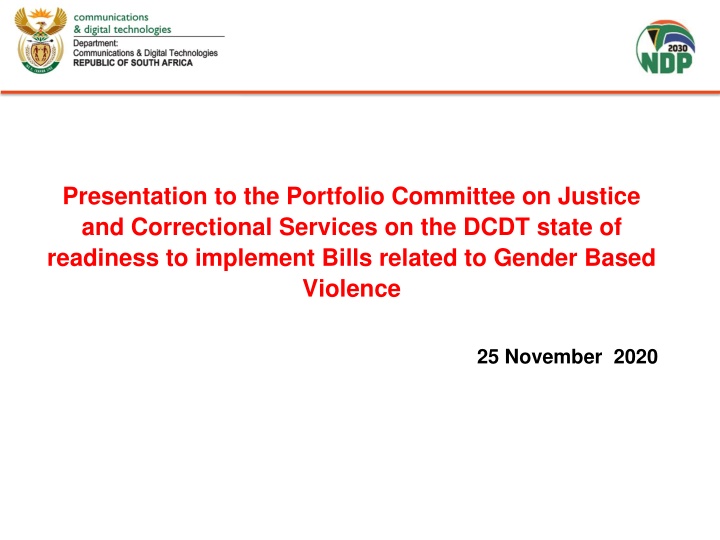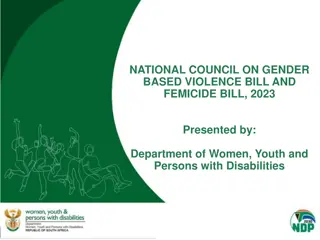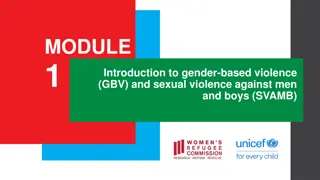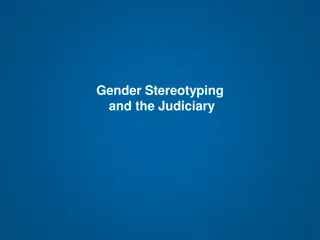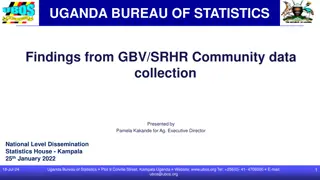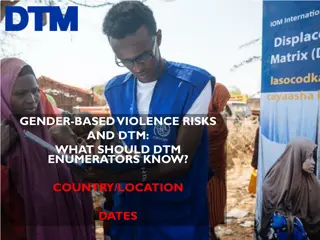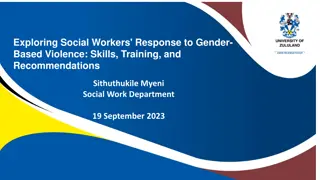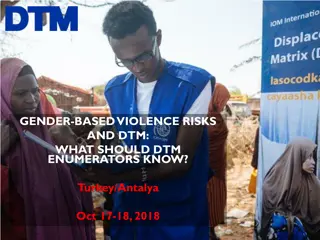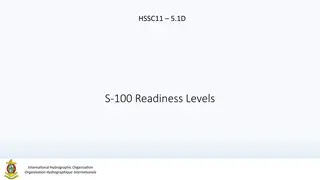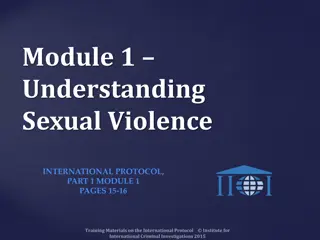Department of Communications and Digital Technologies Readiness for Gender-Based Violence Bills
Briefing the Portfolio Committee on Justice and Correctional Services, the Department of Communications and Digital Technologies (DCDT) outlines its state of readiness to implement Bills related to Gender-Based Violence. The presentation covers the DCDT's vision, mission, and mandate, strategies and programs, institutional arrangements, and its role in fostering digital transformation for economic and social development. Special focus is given to Gender, Disability, Youth, and Children initiatives within DCDT.
Download Presentation

Please find below an Image/Link to download the presentation.
The content on the website is provided AS IS for your information and personal use only. It may not be sold, licensed, or shared on other websites without obtaining consent from the author.If you encounter any issues during the download, it is possible that the publisher has removed the file from their server.
You are allowed to download the files provided on this website for personal or commercial use, subject to the condition that they are used lawfully. All files are the property of their respective owners.
The content on the website is provided AS IS for your information and personal use only. It may not be sold, licensed, or shared on other websites without obtaining consent from the author.
E N D
Presentation Transcript
Presentation to the Portfolio Committee on Justice and Correctional Services on the DCDT state of readiness to implement Bills related to Gender Based Violence 25 November 2020
Presentation Overview 1. DCDT Vision, Mission and Mandate 2. Overview of the DCDT 3. Gender, Disability, Youth and Children [GDYC] at DCDT 4. DCDT strategies and programmes 5. Interventions implemented to date in support of the strategies 6. State of Readiness of DCDT Institutional Arrangements 7. Closing remarks Presentation Purpose To brief the Portfolio Committee on Justice and Correctional Services on the DCDT readiness to implement the Bills related to Gender Based Violence. 2 A leader in enabling a connected and digitally transformed South Africa
DCDT Vision, Mission and Mandate VISION: A leader in enabling a connected and digitally transformed South Africa MISSION: Leading SA s inclusive digital transformation journey through creating an enabling environment towards a digital society to foster socio-economic growth MANDATE: To lead South Africa s digital transformation to achieve digital inclusion that must result in economic growth through creating an enabling policy and regulatory environment A leader in enabling a connected and digitally transformed South Africa 3
Overview and Background of DCDT Constitutional Mandate As supreme law of the country, the Constitution of the Republic of South Africa (1996) applies to all laws, and binds all organs of state, including National Government Departments such as the Department of Communications and Digital Technologies (DCDT). The values enshrined in the Bill of Rights outlined in Chapter 2 which is a cornerstone of democracy in South Africa. It enshrines the rights of all people in our country and affirms the democratic values of human dignity, equality and freedom. DCDT plays a role in fostering broader economic and social participation by all citizens through digital transformation underpinned by the Fourth Industrial Revolution (4IR). The Department is focused on creating a South Africa where citizens can enjoy greater economic and social prosperity and comfort, enjoy higher levels of health, wellbeing and safety through levering the 4IR. The benefits that come with the adoption of these advanced 4IR technologies bring both economic and social advantages and benefits, transforming how we relate as individuals, groups, and organizations across the globe. 4 A leader in enabling a connected and digitally transformed South Africa
GDYC at DCDT To ensure that women, youth, persons with disabilities and children have access to and usage of ICT s for socio-economic development and to monitor the impact of digital transformation on these four target groups. Influence policy development to ensure that the policies generated by the department is responsive to the needs of women, young people, children and persons with disabilities and inclusive of a GDYC perspective Support branches through providing strategic guidance on GDYC matters Facilitate mainstreaming and integration of the GDYC matters within the core business of the department through collaborating with other branches and SoEs Coordinate and facilitate awareness raising on GDYC matters within the department, SoEs and broader ICT sector. To act as the Coordination/Focal Point on all GDYC related matters within the department and to specifically coordinate the E-Cadre Program as the department s Flagship programme. Monitoring the progress the department is making with regard to implementing matters relating to GDYC in all the branches and the SoEs and reporting to the relevant external bodies such as DWYPD, DSD and DIRCO on behalf of the department. 5 A leader in enabling a connected and digitally transformed South Africa
Strategies and Programmes Gender and ICT Strategy Disability and ICT Strategy Youth and ICT Strategy Children and Empowerment ICT Strategy 6 A leader in enabling a connected and digitally transformed South Africa
Interventions implemented to date in support of the strategies [1] Gender Support to the implementation of the Technogirl Programme Support to the implementation of the Mobinet Programme Young Women and ICT Dialogues(FS, KZN &MP) (both Youth and Gender Programme Gender and ICT Literacy Programme Disability Hosted the ICT Accessibility Symposium Provided support to disability organisations and special schools Supported the Disability Chamber of the National ICT Forum Supported the Standardisation and ICT Accessibility Promotion Processes 7 A leader in enabling a connected and digitally transformed South Africa
Interventions implemented to date in support of the strategies [2] Youth The e-Social Cohesion Programme The e-Cadre National Youth Service Programme Child Online Protection Programme (primarily a children initiative but also benefits young people) Children e-Parenting Programme (Parents Interactive Sessions) Child Online Protection School Based Awareness Workshops Provided support to the following programs: Safer Internet Day Child Protection Week National Children s Day Cyberbullying Roundtable (in partnership with CJCP) UNISA YRU Bi-Annual Conference on Children and Mobile Technology, Online Behaviour and Substance Abuse 8 A leader in enabling a connected and digitally transformed South Africa
State of Readiness of DCDT Institutional Arrangements [1] The DCDT has a structure in its organisational structure that is tasked with coordinating and overseeing its work as it relates to Gender Equity and Women s Empowerment, although this structure is not exclusively responsible for this function DCDT has included Gender Equity and Women s Empowerment Targets in its Business Plan for the current financial year. Should the Bills be finalized in this financial year the DCDT does have a focus on gender matters and will then be able to respond to supporting the implementation of the Bills in that manner. DCDT has the mandate to enable the country to be digitally ready and in this regard it will be best placed to advise on how technology can play a role in combatting Gender Base Violence and Domestic Violence. This is one of the key roles the DCDT could play. In terms of readiness to play this role it should be noted that the DCDT has implemented programs in regard. There would be a need to expand on some of the programmes to include matters related to Domestic Violence and in this regard there may be a need to review the financial and human resources available to do this. DCDT has SoE s in its area of focus that can assist with raising awareness on the existence of the Bills amongst citizenry in terms of the readiness. To do this it will have to be discussed with the relevant SOCs but, the observation is that they do have the capacity and expertise to provide this service to have clear enforcement clauses in this regard . 9 A leader in enabling a connected and digitally transformed South Africa
State of Readiness of DCDT Institutional Arrangements [2] The DCDT has also been tasked with the responsibility to oversee the implementation of getting the country for 4IR compliant. There is a great opportunity to support the implementation of these Bill as one of the key factors contributing to Gender Based Violence. There is a need to influence the Bills to include content on the role of technology in combatting GBV, Domestic Violence and Sexual Offences in South Africa and the DCDT will be the best place to provide this insight and support the committee as Bills are developed. DCTD supports the insertion in the Gender Based Violence Bill compelling electronic communications service providers to provide courts with information. In terms the Sexual Offences Bill there is a need to understand the issues of Sexual Offences that are either perpetrated online or through utilizing online platforms to access the persons against whom these offences are perpetrated. 10 A leader in enabling a connected and digitally transformed South Africa
Concluding remarks The President of the country launched the National Strategic Plan on Combatting Gender Based Violence earlier in 2020 and in this plan all departments including the DCDT are obligated to respond to combatting Gender Based Violence in their work and ensure that they incorporate this into how they implement their respective mandates. The introduction of the Bills that are discussed by the Portfolio Committee is a direct response to the National Strategic Plan and therefore the DCDT in support of the Bills and support the implementation thereof through working with the Ministry of Correctional Services and Justice, and supporting the Department of Justice and the Department of Women, Youth and Persons with Disabilities as the lead departments. Although there are no direct obligations in the Bills pertaining to the DCDT we would have support the implementation of the provisions in the bills as Technology is cross cutting and therefore all obligations would pertain to our mandate in so far as supporting the work of the DWYPD to implement the NSP on GBV is concerned The above are the main areas of readiness. The department will engage the entire department and the SOCs around this and provide a comprehensive response. 11 A leader in enabling a connected and digitally transformed South Africa
DISCUSSION 12 A leader in enabling a connected and digitally transformed South Africa
